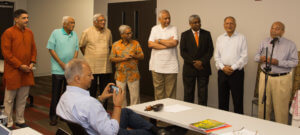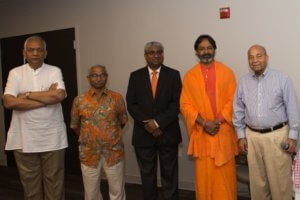Abstract
Academic studies of Hinduism is a necessity, as it can shape the current and future generations’ understanding and appraisal of Hinduism. Academia has larger scale influence and starts impacting human life at a younger formative age. Next to the institution of family, academia has the strongest influence given the amount of time a student spends there. Also bringing an insider’s perspective to Hindu academic studies allows for development of an alternate Hindu worldview paradigm, which helps position Hindu thought, equitably, along with other worldviews. The symbiotic relationship between insiders in academic and non-academic settings, in terms of replenishing the “Śraddha Capital” or the level of one’s sincerity, in the Hindu society, ought to be recognized.

NECESSITY FOR HINDU STUDIES IN ACADEMIC ENVIRONMENT
Introduction
Hinduism is a vast collection of several traditions. It is referred to, by many insiders, in the Hindu fold, as Sanāthana Dharma. The word Dharma has a multi-faceted import. For the purposes of this discussion, we can understand Dharma as a sustaining framework of universally beneficial mass of knowledge and traditions, that guides humanity towards felicity. Thus, Sanāthana Dharma can be freely translated as “Eternal Sustenance” – a framework, in which several mathas (religious traditions) and siddhāntas (well ascertained philosophical foundations) can thrive, while retaining mutual respect.
Problem Statement
If the parents of today’s youth are qualified “insiders” – i.e. well-informed proponents and adept practitioners of Dharma, then their children will have the benefit of receiving right Dharmic education and thus keeping their respective Dharmic traditions alive. But on the other hand, a growing mix of today’s families (Hindu or otherwise), is a product of Western-style education (which has intrinsic anti-Hindu bias, in varying degrees). Such parents are most likely disconnected with their Hindu roots or worse antagonistic to it! If this trend continues, the insider population will dwindle sooner than we are able to imagine!
This raises a serious question, what is the best way of communicating the Dharmic ideas and practices, from one generation to another? The ideas that are in Sanāthana Dharma, have the power to change the world for the better, but only if presented in a manner consistent with the understanding and the will of the human society. The ability to take an idea and reliably disseminate it needs an institution, which systematically bridges the gap between human understanding and will. Family, the most ancient institution available to us, is necessary but not sufficient (as discussed in the previous paragraph), especially when there is a need to operate at a large scale of outreach and influence.
Today the most reliable centers of learning about Sanāthana Dharma are the various āśrams and Gurus (for example Sri Ramakrishna Mission). But the percentage of population accessing these traditional Gurus and ashrams is very small, in comparison to the regular school and college goers. Also, exposure to such Gurus and āśrams often happens very late in most people’s lives. This means that the reliance on Academic institutions (schools, colleges, universities), to introduce Hinduism properly and fairly, at an early age, cannot be avoided.
Power and Influence of Academic Thinkers
Thinkers in academic settings – mainly researchers and professors, often form a very tiny fraction of the human population, in any country or society, but they are powerful enough to decide what ought to be studied by children, youth, and students in general. They influence many aspects of society – from school textbook content to government policies.
From India’s past (i.e. during British India) till date, we know that the academic environment and its output have been utilized as a tool, to create “intellectual sepoys”, out of the Indian society [1]. So clearly the ability of academia, to influence our society, popular discourse, and future generations, is time tested and proven fact. The question then is not whether Hinduism ought to be studied in an academic setting, but how to significantly increase the number of Hindu insiders, in academic Hindu studies.
Evolving Alternate Paradigm – Hindu World View
The argument so far in this essay was focused on the need for accurate representation, reliable communication, and broader outreach, as it relates to Hinduism and how this can be achieved, with the injection of insiders, into academic study of Hinduism.
Now we will consider another strong motivator for academic study of Hinduism – namely leveraging the unique vantage point Sanaathana Dharma offers to researchers, to study non-Hindu world religions and systems of thought. As mentioned in section I, Sanāthana Dharma offers a framework for sustaining several mathas and siddhāntas, which can coexist and thrive, with abiding mutual respect. Their mutual respect is due to the mature understanding that finite human attempts at exploring the infinite, are bound to give rise to multiple expressions or approaches, along the way. This plural, inclusive, mature understanding is rooted in Vedas (or sacred revealed knowledge of the Hindus), which forms the bedrock of Sanāthana Dharma.
The Vedas and Sanāthana Dharma also offer a non-dogmatic framework, encouraging inquiry and study, which can be directed towards studying different traditions and worldviews. This approach helps evolve a fresh alternate paradigm to studying different world systems of thought and religions, through a versatile Hindu lens. This kind of study in an academic environment will serve to highlight Hinduism’s unique credentials (suited to studying world thought systems) and also position the Hindu worldview, equitably, along with other existing world views. Such an effort will surely have universally beneficial – academic, cultural, and political ramifications.
Śraddhā Capital
Śraddhā plays a key role in the insider’s approach to studying Hinduism. One of the key tenets of a person, being endowed with Śraddhā, is his or her, well-reasoned acceptance of Vedas as “Pramana” or reliable means of knowledge. This is usually achieved, after receiving valuable traditional insights from the Guru [2 – verse 25]. Now, this creates a unique situation, wherein, to introduce people endowed with Śraddhā a.k.a insiders, into academia, we need to draw from the “Sraddha capital”, in the society. Developing this “Śraddhā Capital ”, is a key prerequisite for evolving Hindu studies in an academic setting. This clearly shows the symbiotic relation between academic insiders and non-academic insiders of today (i.e. parents, traditional ashrams, and Gurus), which is instrumental to growing the insider voice and population.
Conclusion
Investing into promoting the insider’s voice in the academic study of Hinduism is necessary, to (1) present a fair appraisal of Hinduism to current and future generations (2) develop an alternate, distinctly Hindu paradigm, of studying world religions and systems, and (3) thereby enriching the world. This whole process relies upon drawing from the “Śraddhā capital” in the Hindu society, which in long run, can be replenished by a growing level of insiders voice in academia.
References:
- Rajiv Malhotra, “Academic Hinduphobia: A critique of Wendy Doniger’s erotic school of Indology”, Voice of India, New Delhi, 2016
- Swami Madhavananda, “Vivekachudamani of Sri Sankaracharya”, Advaita Ashrama, Mayawati, 1944










